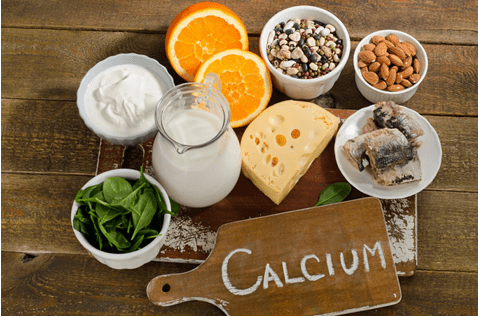
The average adult’s weight is made up of about 2% calcium. Most of this is found in the skeleton and teeth – the rest is stored in the tissues or blood. Calcium is vital for healthy teeth and bones. It also plays a crucial role in other systems of the body, such as the health and functioning of nerves and muscle tissue.
Good sources of calcium include dairy foods like milk, yoghurt and cheese, and calcium-fortified products, such as some plant-based milks (for example, soy milk and rice milk) and breakfast cereals.
People at different life stages need different amounts of calcium – young children, teenagers and older women all have greater than average requirements.
According to the most recent National Nutrition and Physical Activity Survey of 2011-12:
Over half of all Australians aged 2 years and over consume inadequate levels of calcium from food sources.
Females are less likely to have adequate intakes of calcium than males.
73% of females consume less calcium than recommended.
51% of males consume less calcium than recommended.
It is much better to get calcium from foods than from calcium supplements. Be guided by your doctor about whether you need additional supplements. Too much calcium from supplements may cause other health problems.
Role of calcium in the body
Calcium plays a role in : strengthening bones and teeth
regulating muscle functioning, such as contraction and relaxation
regulating heart functioning
blood clotting
transmission of nervous system messages
enzyme function.
Calcium and dairy food
Australians receive most of their calcium from dairy foods. If milk and milk-based foods are removed from the diet, this can lead to an inadequate intake of calcium. This is of particular concern for children and adolescents, who have high calcium needs.
Calcium deficiency may lead to disorders like osteoporosis, a disease in which bones become fragile and brittle later in life. Osteoporosis affects both men and women.
Too little calcium can weaken bones
If not enough calcium is circulating in your blood, your body will use hormones to reduce the amount of calcium your kidneys excrete in your urine.
Though not enough calcium is absorbed through the gastrointestinal tract, calcium will be taken from the bones.
If your dietary intake of calcium is constantly low, your body will eventually remove so much calcium from the skeleton that your bones will become weak and brittle.
People with special calcium needs
It is particularly important that people from certain groups meet their calcium needs. These groups include:
Babies – formula-fed babies are estimated to need more calcium than babies that are breastfed, because the calcium in infant formula may not be absorbed as efficiently as that found in breastmilk.
Young children – skeletal tissue is constantly growing, so young children have high calcium requirements.
Pre-teens and teenagers – puberty prompts a growth spurt, which in turn increases calcium requirements. This group also needs more calcium to build peak bone mass.
If the skeleton is strengthened with enough calcium during these years, diseases like osteoporosis in the later years are thought to be less likely.
Elderly people – as we age, the skeleton loses calcium. Women lose more calcium from their bones in the 5 to 10 years around the age of menopause. However, both men and women lose bone mass as they grow older and need to make sure they get enough calcium in their diet to offset these losses. While a diet high in calcium cannot reverse age-related bone loss, it can slow down the process.
Caucasian (white) people have larger frame sizes and generally have higher intakes of animal foods, caffeine and salt than non-Caucasian people. It is thought they may need more calcium as a result.
Pregnant and breastfeeding women and calcium
A developing baby needs a lot of calcium. However, there is no need for women to take additional dietary calcium during pregnancy because pregnant women absorb calcium from food more efficiently.
Breastfeeding women do not need to increase their calcium intake, unless they are adolescents.
Calcium supplements
It is much better to get calcium from foods (which also provide other nutrients) than from calcium supplements. But if you have difficulty eating enough foods rich in calcium, you might need to consider a calcium supplement, especially if you are at risk of developing osteoporosis. Before taking supplements, it’s best to discuss this with your doctor or other registered healthcare professional.
If you do take calcium supplements, make sure you don’t take more than the amount recommended on the bottle. Too much calcium may cause gastrointestinal upsets such as bloating and constipation and, rarely, other complications such as kidney stones.
Calcium supplements – complications
A report published in 2010, and widely reported in the media, found a possible link between calcium supplements and an increased risk of heart disease – particularly in older women. The levels of calcium intake of participants in the trials reviewed were up to 2,400 mg/day, achieved by taking supplements. This is above the Recommended Dietary Intake (RDI), which is between 1,000 and 1,300 mg/day for adults, depending on age.
Although high levels of calcium intake through supplementation may be of concern, calcium supplementation at levels of 500 to 600 mg/day is both safe and effective for reducing the risk fractures in people who don’t get enough calcium from their diet. If you have any concerns about calcium supplements, talk to your doctor or other registered healthcare professional.



